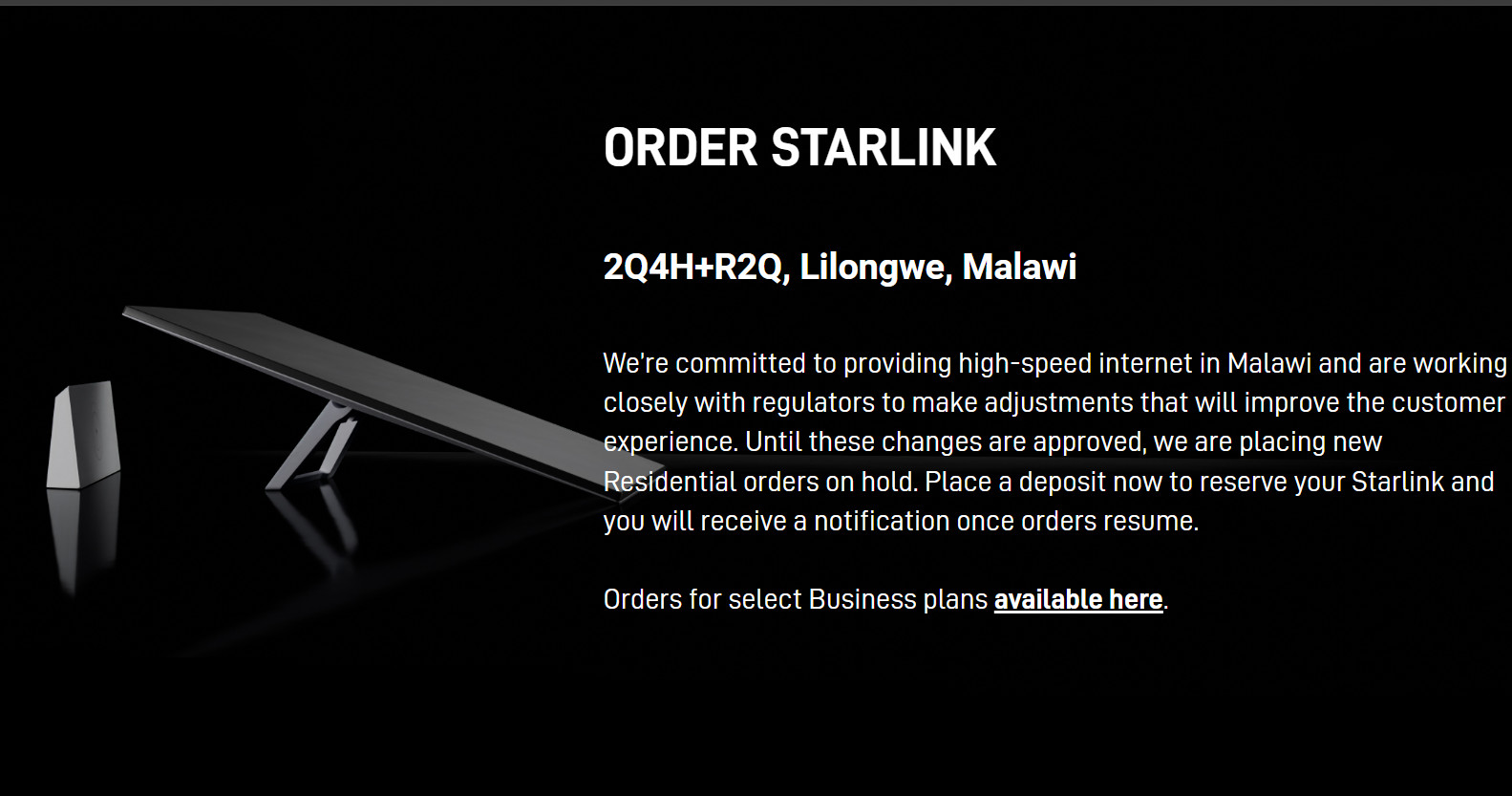Elon Musk’s satellite internet, Starlink, has paused the sale of certain business subscriptions and new residential subscriptions in Malawi.
The suspension comes after a proposal to raise the subscription fee to reflect the depreciated Malawian Kwacha was rejected by the Malawi Communications Regulatory Authority (MACRA).
When an intending subscriber from Malawi tries to sign up for the Starlink service, the response from the company reads: “We’re committed to providing high-speed internet in Malawi and are working closely with regulators to make adjustments that will improve the customer experience. Until these changes are approved, we are placing new residential orders on hold. Place a deposit now to reserve your Starlink and you will receive a notification once orders resume.”
Read also: Starlink suspends price hike in Nigeria over ‘regulatory challenges’
On the black market, the value of the Malawian Kwacha is roughly 2600 to the US dollar, whereas, on the official market, it is 1700. Because of this, the official market does not have enough US dollars to cover the cost of subscriptions to the US corporation, as one dollar is equivalent to 1,734MWK.
According to a Malawian source Techzim contacted, the only option left is Business 2TB Priority, which costs MK190,000 per month. Additionally, the new Business 40GB and 1TB Priority Plans are no longer available. The source also said that the current subscriptions are unaffected at this time.
Currency devaluation affecting Starlink’s subscription plans in Nigeria, Malawi, other African countries
In Africa, Starlink’s goal is to charge roughly $50 for the Standard Residential subscription. However, subscribers in countries like Malawi and Nigeria wind up paying far less in USD due to the loss of local currency value. Currently, Standard Residential subscription in Nigeria costs N38,000 ($23.24) while it costs MK64,000 ($36.90) in Malawi.
Last month, Starlink had a run-in with Nigeria’s telecoms regulator after the company was forced to reverse a price hike that had been denied by the regulator. Record shows that Nigeria’s economy is far bigger than Malawi’s, and Starlink is motivated to make concessions there.
It will be intriguing to observe how this situation plays out in the two nations, as currency value distortions are prevalent throughout Africa.
Such a scenario will likely occur in Zimbabwe if TelOne and Aura, Starlink authorised resellers, begin to accept payments in local Zimbabwe currency at the official government rate. We haven’t seen any indication that they’re prepared to do this yet. If Starlink is unable to return subscriptions paid for in USD to its resellers, that could potentially become a problem.
Starlink kits are sold out in Zimbabwe and Nigeria
Because Starlink terminals are “sold out” in Nigeria’s largest cities such as Lagos, Abuja, Port-Harcourt, Benin City (Edo State), and Warri (Delta State)—residents can no longer order them. This is according to a map on Starlink’s website – https://www.starlink.com/ng/map.
A non-availability notification was also displayed when an address from any of the five cities was entered to place an order.
“Starlink Residential is not available in your area. Enter your email below to be notified about future availability and product updates, or if Starlink is active in your market, visit our Roam page to order our mobile offering,” reads the response when trying to order for an address in Lagos.
Existing users are not impacted in any way when new sign-ups are suspended in certain areas.
The kits are still available for purchase by Nigerians outside of the sold-out regions of the nation.
It was discovered that the high demand for Starlink is not limited to Nigeria, as the firm’s terminals in Harare, the capital of Zimbabwe, are currently sold out less than two months after authorities gave the company permission to operate in the southern African country.
Nigeria and Zimbabwe are the only two African countries where Starlink terminals have sold out, according to a Bloomberg report.










